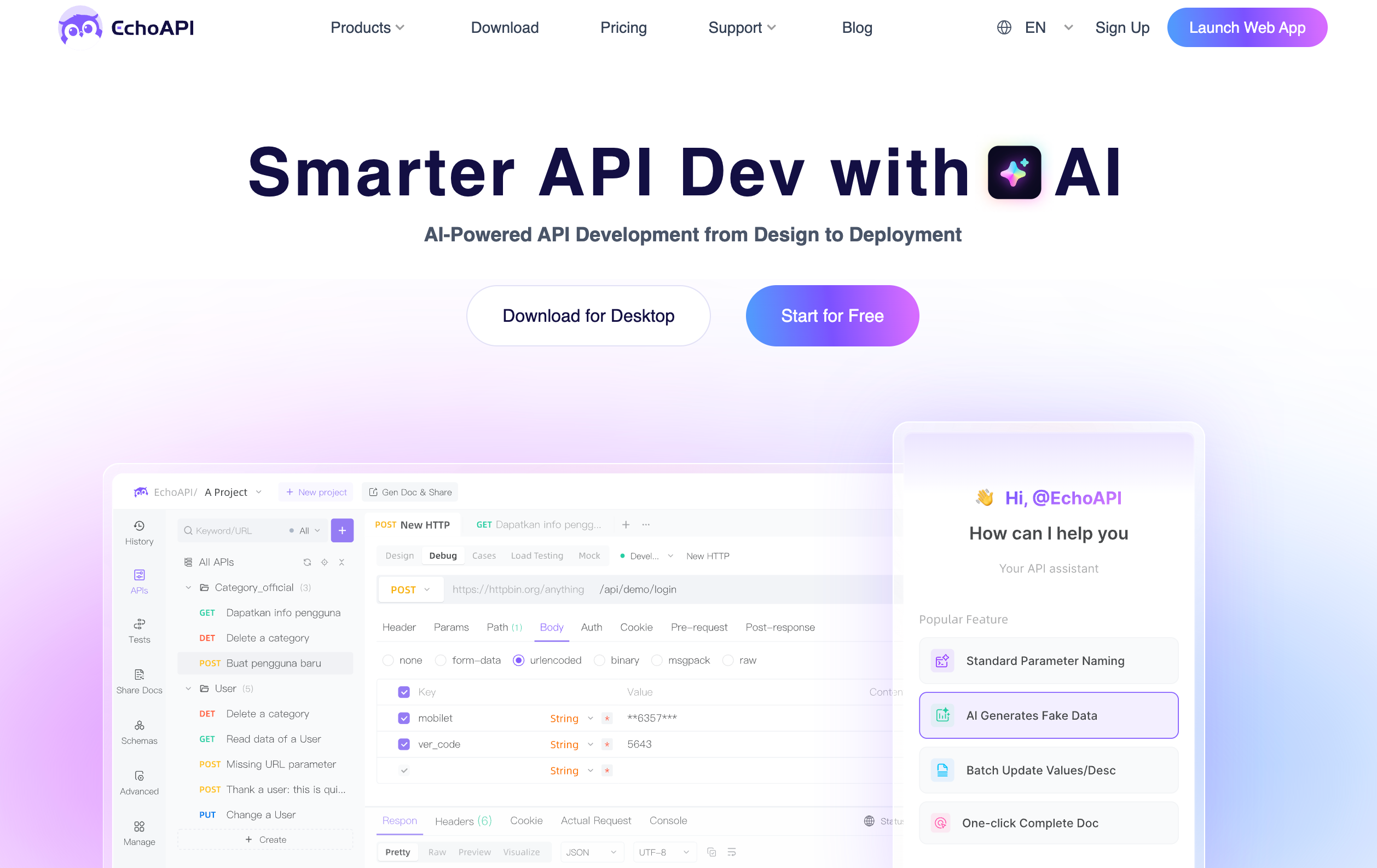Supercharge Your API Workflow with EchoAPI: Smarter Scripts, Faster Debugging, Zero Headaches
Developing APIs can often feel like herding cats—tedious, error-prone, and requiring constant oversight. EchoAPI changes the game by injecting AI-driven smarts into your API workflow, turning chaos into controlled, efficient development.
Writing APIs is a lot like raising toddlers.
You tell them a hundred times: “Don’t forget your token when you leave the house!”
But the moment they're out the door, they're streaking through production with no headers and zero shame.
You clearly documented: "email_address" is the required field.
And what do they send you? "email".
Looking all innocent like: “Isn’t that the same thing?”
Debugging becomes a full-body workout:
Switch environments, copy logs, screenshot errors, send 17 messages in Slack...
At this point, it’s not efficient development—it’s an endurance sport.
So I asked myself:
Why can’t APIs just think a little for themselves?
Then I discovered two secret weapons—my new favorite duo:
Pre-request scripts: The API puts on its shoes before going outside.
Post-response scripts: The API wipes its feet, files a report, and takes out the trash when it gets back.
And the best part?
I didn’t have to hand-roll these scripts.
I use a brilliant little tool that makes all of this feel like magic:
EchoAPI — the API toolbox with a brain and manners.

Scenario 1: Forgot Your Token Again? No Problem.
Ever had this conversation?
Dev: “Hey, I think your API is down. I’m getting 401s.”
You: “Did you pass the auth token?”
Dev: “…what auth token?”
Your docs say clearly: “Include the X-Auth-Token header.”
But let’s be real—nobody reads docs.
With EchoAPI, you can set up a pre-request script right in the API editor:
pm.setRequestHeader("X-Auth-Token", "test-token-123456");
Boom. Now every time someone hits the endpoint, the token is there—no questions, no excuses.
The API learned how to dress itself.
Like ordering takeout and forgetting to request utensils—EchoAPI hands you a fork and tosses in some napkins too.
Scenario 2: Dynamic Params? Let the Script Handle It
Mocking data gets old fast. Especially when you’re hardcoding new usernames, timestamps, or dummy emails for every test.
EchoAPI’s pre-scripts can run JavaScript and inject variables directly.
Write your logic:
const name = "user_" + Math.floor(Math.random() * 1000);
pm.globals.set("mock_username", name);
Then just use {{mock_username}} in your request body.
Every request gets a fresh value—no clicks, no edits, no tears.
Perfect for stress testing or mocking without the burnout.
Scenario 3: “This Response Is a Mess. I Just Need the Basics.”
Frontend dev: “Hey… can you return only the fields I actually use?”
Backend dev: “But I need the logs and trace IDs…”
Frontend dev: “Cool, you keep those. I don’t wanna parse it.”
In EchoAPI, your post-response script can clean things up just for debugging:
const user = response.body.data;
response.body = {
id: user.user_id,
name: user.username
};
So during testing, your frontend team gets exactly what they need.
Meanwhile, you keep the full raw response for logs.
Debugging speed doubled. Slack arguments reduced by 90%.
Bonus Scenario: API Failed? Auto-Ping Slack, Instantly.
Let’s say your endpoint returns a error. Or it’s too slow. Or missing a key field.
Now what?
You could manually screenshot logs and ping the DevOps team.
Or... just let EchoAPI do it:
if (response.status !== 200) {
pm.sendRequest("https://slack.com/api/webhook/alert?text=API%20failure!");
}
Yup. Your API breaks, and EchoAPI is already sounding the alarm before you even open your terminal.
Faster alerts = less chaos.
Quick Summary of Use Cases
| Scenario | Script Type | Code Snippet | What It Solves |
|---|---|---|---|
| Auto-add token header | Pre-request | pm.setRequestHeader(...) |
Auth tokens always included |
| Random param generation | Pre-request | JS + pm.globals.set(...) |
Unique mock values on every call |
| Auto-fill query params | Pre-request | pm.setRequestQuery("page", "1") |
URLs never miss required params |
| Fail-safe alerts | Post-response | pm.sendRequest(...) |
Sends alert if API misbehaves |
| Response cleanup for FE | Post-response | Rewrite response.body |
Only return needed data |
| Auto-test assertions | Post-response | pm.test("status is 200", ...) |
Built-in assertions for endpoints |
When Do These Scripts Run?
Think of it like this:
Pre-script: Puts on shoes, grabs a raincoat, checks the mirror.
Request goes out.
Post-script: Comes home, washes hands, files a report, logs the receipts.
Why EchoAPI Feels Like a Cheat Code
✅ Fully visual script builder –
Write powerful logic without wrestling raw code. Use templates and autocomplete.
✅ Powerful variable system –
Global, local, and environment vars handled cleanly. One config = reusable across your whole project.
✅ Chained requests –
Need to hit API A, then API B? No problem—EchoAPI supports linked requests and shared state.
✅ One-click environment switching –
Switch between mock, dev, staging, and prod with zero headaches.
✅ Team collaboration + access control –
Everyone sees the same setup. No more “Did you update the docs?” in Slack.
Make Your API Smarter, Your Team Happier
APIs without scripts?
They work—but they’re dumb and fragile.
APIs with smart scripts + EchoAPI?
They’re team players. They self-heal. They debug themselves. They help you ship faster.
Stop duct-taping requests together and playing phone tag every time something breaks.
EchoAPI is your full-time API assistant:
Automated debugging. Smart responses. Real-time alerts. One less thing to worry about.
The Final Formula for Clean API Development:
Reliable APIs = Good Design + Smart Scripts + EchoAPI Covering Your Back
👉 Try EchoAPI today, and upgrade your endpoints from “barely usable” to “shockingly helpful.”
Explore EchoAPI ›




 EchoAPI for VS Code
EchoAPI for VS Code

 EchoAPI for IntelliJ IDEA
EchoAPI for IntelliJ IDEA

 EchoAPl-Interceptor
EchoAPl-Interceptor

 EchoAPl CLI
EchoAPl CLI
 EchoAPI Client
EchoAPI Client API Design
API Design
 API Debug
API Debug
 API Documentation
API Documentation
 Mock Server
Mock Server








